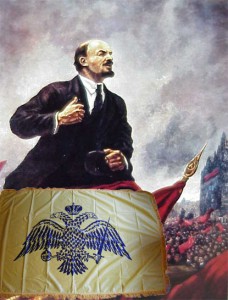Did the Byzantine Empire Fall in 1991?
 Drew asks if we can consider the Soviet Empire as a continuation of Byzantium. It’s well known that Moscow at one time considered itself as the ‘third Rome’ (or second Constantinople). There were some compelling reasons to think this. Moscow was originally built on seven hills like Rome and Constantinople, Russian troops had been serving in the Byzantine army since the 10th century, and the Russian alphabet, Orthodoxy, and (to some degree) culture had been provided by Byzantium. When Ivan III married Sophia Paleologus- the niece of the last Byzantine emperor- he had a strong claim to be the legitimate heir to the Roman Empire.
Drew asks if we can consider the Soviet Empire as a continuation of Byzantium. It’s well known that Moscow at one time considered itself as the ‘third Rome’ (or second Constantinople). There were some compelling reasons to think this. Moscow was originally built on seven hills like Rome and Constantinople, Russian troops had been serving in the Byzantine army since the 10th century, and the Russian alphabet, Orthodoxy, and (to some degree) culture had been provided by Byzantium. When Ivan III married Sophia Paleologus- the niece of the last Byzantine emperor- he had a strong claim to be the legitimate heir to the Roman Empire.
Setting aside Ivan for a moment, we can dismiss the Soviet Empire entirely. It was a reaction against the very institutions which drew their inspiration from Byzantium. It replaced Orthodoxy with its own saints- Marx, Lenin, Stalin, etc- and did away with the traditional and political underpinnings of the Tsardom.
A better case can be made that the Russian Revolution of 1917 ended Byzantium, but there are still some serious problems with this. For all of the similarities the Russian Empire was a unique entity. They added their own influences into the mix and ultimately drew their inspiration from the Slavic world not the Greek one. More importantly, they didn’t think of themselves as a continuation so much as use imperial Byzantine symbols to legitimize their own rule. Ivan wrapped himself in the double eagle because it added to his prestige, not because he thought of himself as a new Constantine. He was more interested in keeping Ivan alive (and in power) than in resuscitating Byzantium. Constantinople was only important so far as it aided that goal.
A case in point is the 2009 Russian video “Death of an Empire: the Byzantine Lesson” which is narrated by Vladimir Putin’s father-confessor. (you can watch the entire thing on youtube) The film draws a parallel between Byzantium and Russia and the message is that the West is not to be trusted. The Byzantine Empire is pressed into service as a surrogate Russia, and its fall is a warning not to fall into the debt of the West. But the narrator’s call is not to restore Byzantium, it is to restore the Orthodox Russian Empire; an entity not a successor.
Well, Putin himself does have some things in common with Byzantine emperors he poisoned his opposition which is certainly Byzantine of him to killed off arrivals or politcal threats. As mention above modern Russian society probably less in common with the Byzantine or even the Russian Empire and more in common with modern Republics. True,some Russian Emperors bahave similar to Byzantine ones as well. He’s right probably the religion is what is the most common with all three societies. Orthdoxy with the help of the state is making it difficult for christian arrivals such as protestants and roman catholics but so does modern Greece which is more democratic and probably less corrupted compared to Russia, though the Russia people are more into piety than the Greeks. In orthodoxy being a leader that kills some enemies off is ok even Justinian is a Saint in the Orthodox Church though there are some that don’t except because of heresy mention toward the end of his life in Evagrius Scholastius. Orthodox have a different prespective than Protestants and Catholics on tough leaders that kill off some enemies. Granted, some younger orthodox in Russia don’t agree with this.
If we HAVE to choose a date on the permanent demise of Byzantium, it should be 1821, the starting date of the Greek War of Independence.
It is silly to assume that just because the Roman state was formally dissolved in the 1453, that the Roman society or people ceased to exist as well.
The Ottomans were constantly putting down Roman revolts ever since 1453, including two major ones in the Peloponessus in the 17th century (Morean War) and 18th century (Orlov War). The reason the revolt in 1821 eventually succeeded is because the spiritual and military leaders of the Roman people managed to ensure aid from the Great Powers by appealing to the Romantic Movement sweeping Europe at the time.
Rather than publically proclaiming an independent Roman state like in the previous revolts, this time they proclaimed an independent Greek state. People would be Greek citizens, not Roman citizens which was naturally expected. The head of state was to be called King of the Greeks, rather than King of the Romans thus ending the lineage with Constantine Palaeologus XI.
Publically denouncing the Roman heritage and embracing an artificial Greek heritage was a way to inspire the people of Europe and form an alliance against the Ottomans.
This created a very peculiar situation in Greece proper and Asia Minor, as most of the Greek population lived outside the Peloponessus and still considered themselves Romans. As this new Greek state expanded and annexed territories, so did the people gradually forget their Roman identity.
Greece and the Greeks are the descendants and inheritants of the Roman Empire and society, not the Holy Roman Empire and certainly not the Soviet Union.
03AHJ_VutfTV3xxrvBz5sQMu3Ey7XA-Q-80Ws_U5rsxcUBn8X7YAyw_m8k73ZoMDAhe9mh4Latq0TRSArjz8fYFqMJ42sNyRQqotKsXzGPW13mPr4OXx33WeE3bs79m2QLo5gJDc1AQB30